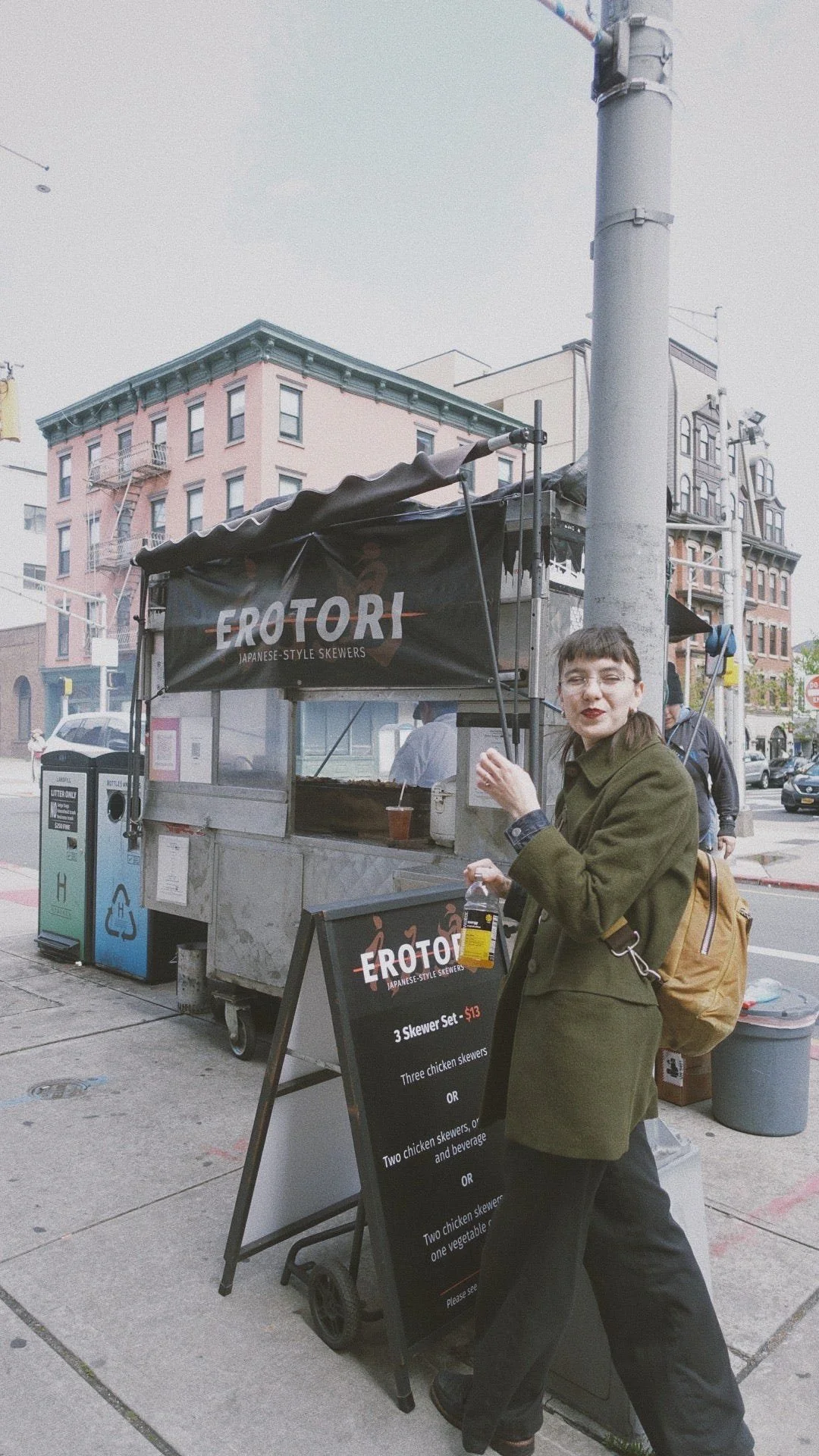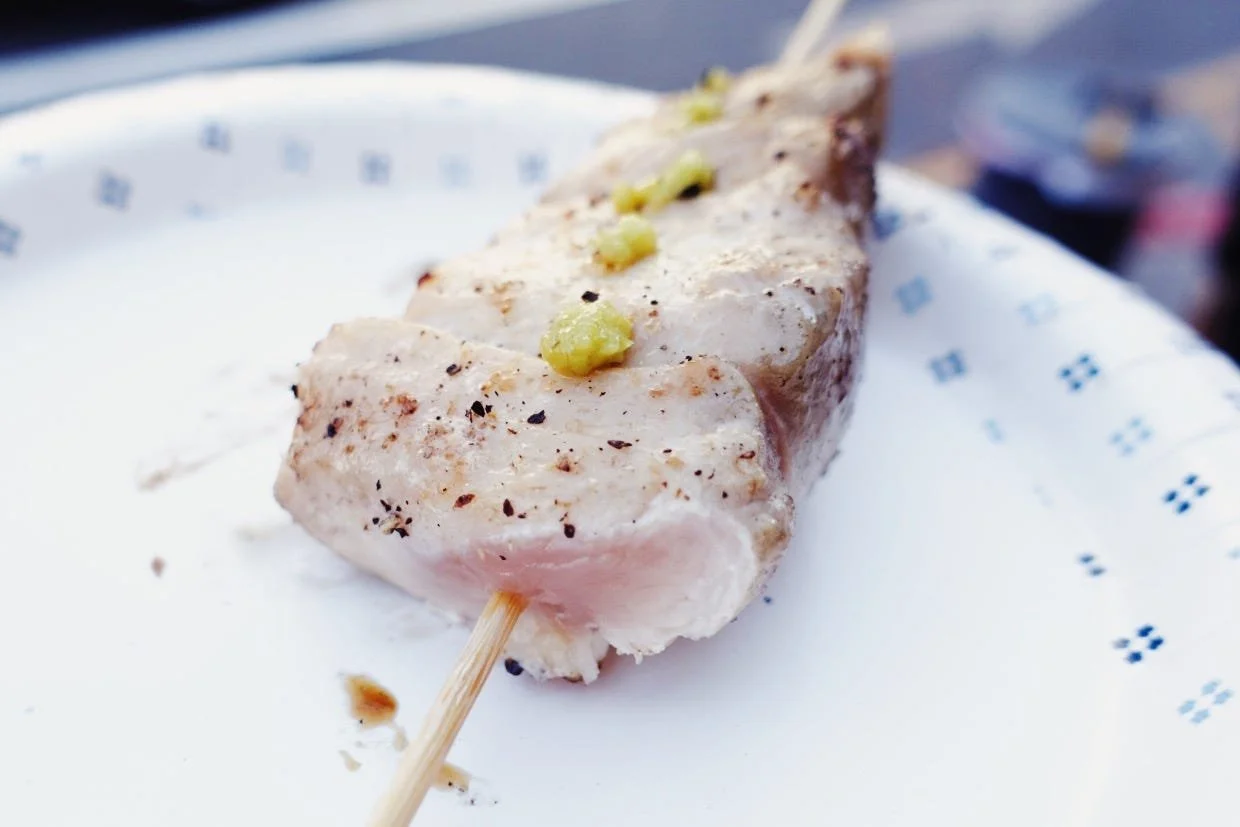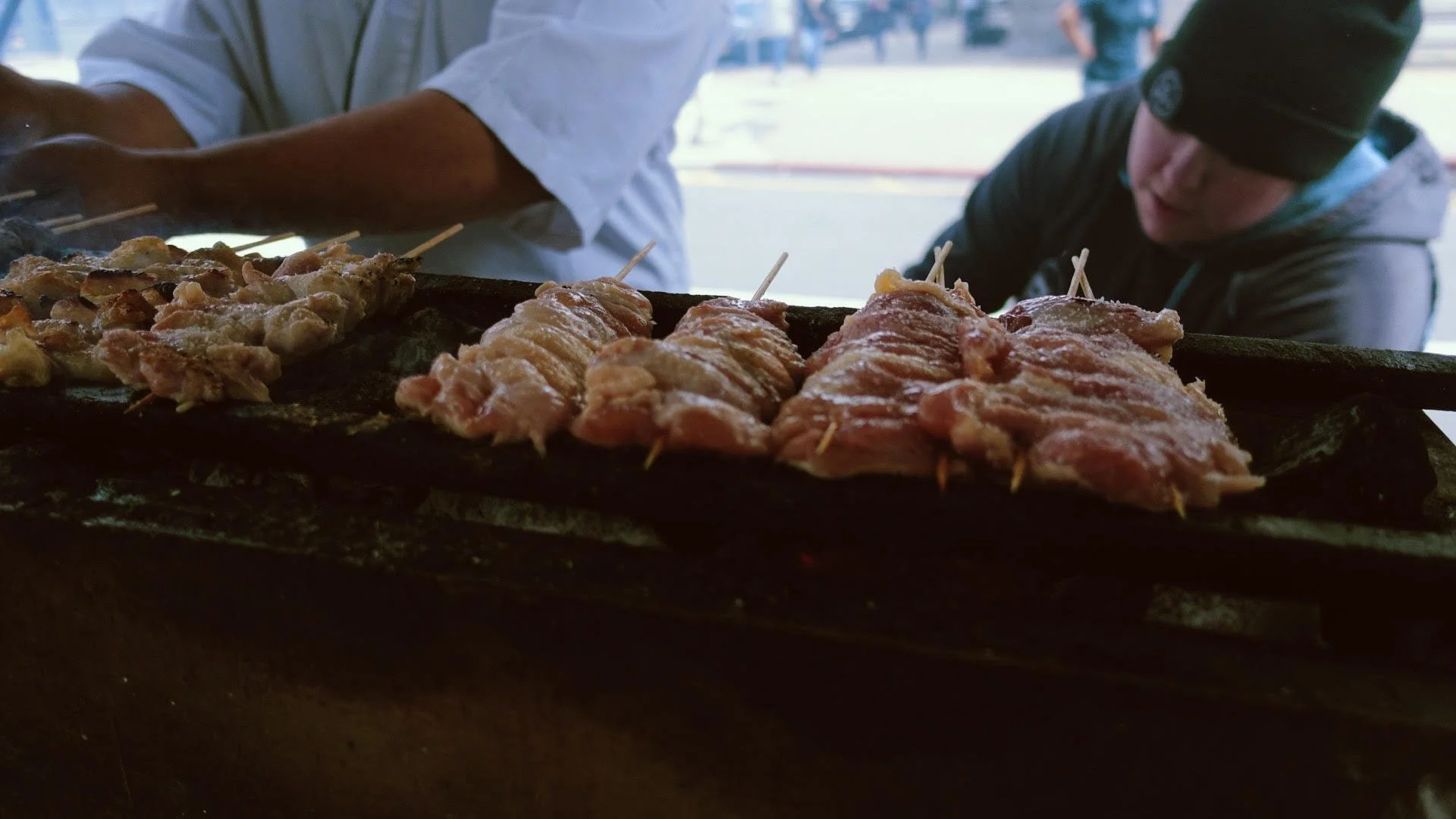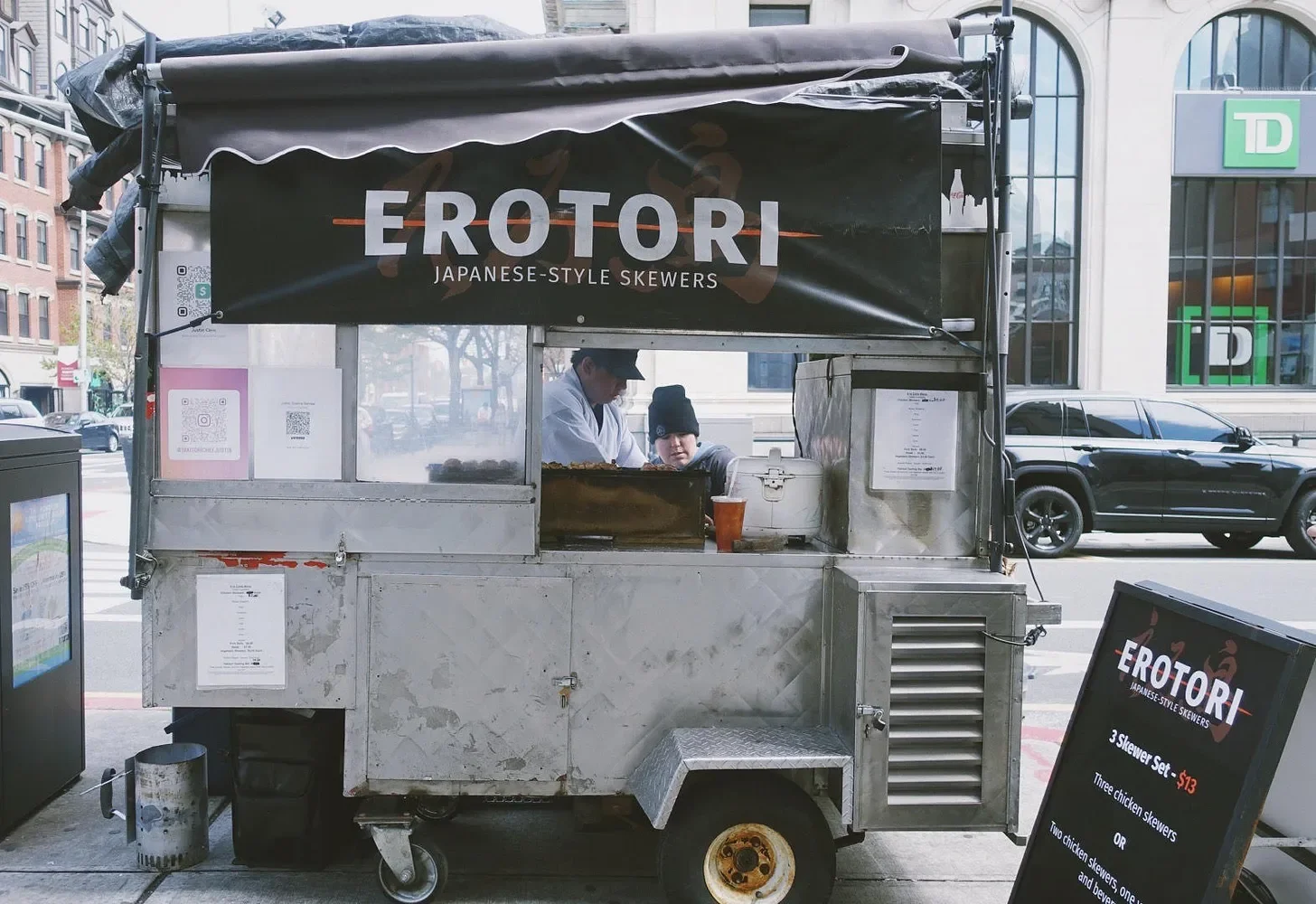Smoke on the Street Corner
Good afternoon from sunny Jersey City, where summer seems to have officially arrived! My neighbors are furiously pruning their overgrown lawn with a chainsaw, and I am once again in awe of how Jersey turns into a jungle come summertime.
In micro-local news, I am watching all of my herb sprouts climb towards the June sun, having partaken in what Tik Tok is calling “chaos gardening” but has been my default method for a long time: randomly plant your seeds with nothing but intuition and see what survives. The result? A delightful, tangled mess of edible herbs and flowers that sprout based on survival of the fittest. (Maybe it’s the wild western Wyomingite in me that demands all of my plants survive this way, but you’ve really got to earn your place in my yard, I suppose.)
Subscribe if you want more of the good stuff in your inbox :)
Now, onto the good stuff.
Today’s letter is another long-overdue piece on Erotori, one of Hoboken’s finest hidden gems. Although, perhaps not so hidden if you’ve ever walked past the train station on a lucky day.
It’s a yakitori cart run by the talented yakitori chef Justin Guerra-Sarreal. You can find him on Instagram, through word of mouth, or by passing by the cart, parked in front of the Starbucks on the corner of Newark and Hudson in Hoboken.
There isn’t a website, and when it rains you’ll just have to take a rain check. As with most of my favorite food establishments, you get what you get when you’re lucky enough to get it - and that alone is worth the experience.
I met with Justin on a pleasantly windy day in March. Even at that moment I knew I was long overdue for a visit, since I biked past his cart on a near-daily basis. It had been calling my name for weeks, smoke drifting up the street, begging me to pull over my bike and try a skewer.
“How adventurous are you?” Justin asked as I approached the cart. One of my all-time favorite possible questions. The answer, of course, is very.
If you’re in the neighborhood you’ve likely walked past the stand, or have seen Justin pushing his cart up the Hudson Street bike lane. Weather permitting, he sets up on Tuesday, Wednesday, Friday, and Saturday like clockwork, and believe me when I say the tenor of the street changes as he fires up the grill. The charcoal warmth of the Binchotan smoke whispers up the alleyways, alerting hungry pedestrians that Erotori is open for business. The orders start rolling in right away, thanks to the ease of Justin’s text-your-order system, which lets people get in line ahead of time.
Justin runs his cart with precision and patience, deftly whipping up yakitori skewers with meticulous care. He’s clocked in hundreds of hours under Yakitori Torishin in midtown Manhattan, and the muscle memory is permanent.
“I learned yakitori in the city,” Justin says. “One of the only ways to have yakitori in America right now is if you go to a restaurant in the city. It ends up being very expensive. But traditionally, this is a street food. I want to bring it back to its roots, and make it more affordable because, you know, at the end of the day it’s just grilled chicken.”
He pauses thoughtfully for a second, adding, “Well, it’s not. It’s more than that, of course. But I wanted to differentiate myself from the restaurant scene and focus more on just putting out quality food.”
“I want to bring it back to its roots, and make it more affordable because, you know, at the end of the day it’s just grilled chicken.”
The orders start to roll in as we chat and the grill starts to fill up. Sizzling chicken fat rolls off of the charcoal, releasing fragrant smoke into the air.
“I was in college for like, six years,” Justin continues without missing a beat. “I studied culinary arts, food service management, and then culinary nutrition for a bit. And then I filled up my time by taking extra courses, getting a minor in accounting and psychology.”
Each of these areas of expertise - accounting, psychology, culinary skill and foodservice management - have built Erotori from the ground up. The interplay of practical skill, industry knowledge, and fundamental business expertise is what makes his operation so successful.
“Understanding what motivates people to buy is really huge,” Justin acknowledges with a grin. As if on cue, a regular customer strolls past, skewer in hand, shouting and waving, “This is the best, man!”
Justin takes a second to lead me through the menu he’s prepped for me. I am humbled, and (fortunately) very hungry. He’s offered to share nearly his entire current menu with me. A vast array of skewers, from chicken to pork to vegetables, and every cut in between, await their turn on the grill. My first dish, however, is off-menu, and something that he doesn’t even regularly offer, but I’d be completely remiss not to mention it, because I haven’t stopped thinking about it since. There’s a caveat, however —
“You have to promise not to sue me,” he laughs.
I repeat out loud for the record, “I trust you - and I promise not to sue you.” He follows up with, “How do you feel about eating rare chicken?”
Now, some people might balk at this question. I, for one, have been waiting for a moment when the stars align to consume raw chicken (intentionally and well-prepared, of course, but rare nonetheless) and the thrill I feel is akin to getting on the elevator at Disney’s Tower of Terror. The moment has finally arrived.
I repeat out loud, for the record, “I trust you - and I promise not to sue you.”
Justin hands me a chicken skewer, simple and unassuming, dotted with earthy green wasabi pearls. “This is chicken breast tenderloin,” he explains. “Made in the traditional style with wasabi.”
Was I worried about salmonella? No, not one bit. My level of confidence in Justin’s ability to cook was nearly one hundred percent— after hours of ServSafe training and weeks-long food safety modules in culinary school, I didn’t have an ounce of doubt.* Plus, I figured anyone with the confidence and nerve to serve a fellow cook-slash-food-journalist a skewer of pink chicken most certainly knew their stuff.
The chicken itself was smoky and succulent, simple but undeniably rich with the flavor of… itself. Yes, I know how ridiculous of a sentence that is to write, but the very nature of the ripping-hot Binchotan grill is to imbue the skewer with the smoke of its own juices, the literal essence of itself.
A word about the grill: the Binchotan is a long, extraordinarily hot grill that runs off of Binchotan charcoal, which is hotter, cleaner and longer-lasting than traditional charcoal. It’s virtually smokeless and odorless, allowing for precision and flavorful char, as well as basting the sizzling skewer in its own fragrant, fatty smoke. Often used in yakitori cooking, it can also be found in many Japanese restaurants, although chefs of all kinds tend to favor it these days.
Justin’s experience using the Binchotan grill came after years of working in various Japanese restaurants, starting in the world of sushi.
“After I graduated from JWU (Johnson and Wales University), I immediately started at Tao Downtown. I worked the sushi line there and working in sushi I quickly learned that, uh… I hate making sushi,” he laughed. “There’s really no cooking. Sushi is just a lot of preparation, you know?”
He passes me another skewer, this time a golden scrunch of chicken skin, dripping in its own fat.
“You’re going to get two kinds of skin today,” he says. “This one is the fatty skin, and the next one will be crispy.”
Our conversation turns back to his restaurant career. “So, I wasn’t into making sushi. I later found Yakitori Torishin and applied there, got the job, and immediately fell in love with the cuisine. I’d never had chicken this way. It highlights so many of the different textures and flavors. It’s really funny because I went into culinary school thinking mashed potatoes came out of a box, you know? It was bad!”
“I’d never had chicken this way. It highlights so many of the different textures and flavors. Which is really funny because I went into culinary school thinking mashed potatoes came out of a box, you know?”
He’s clearly come a long way since then, judging by the line of eager diners. The street corner is abuzz. Our conversation is punctuated with orders from excited, hungry guests and folks asking eagerly for organ meats. (Amazing.) When I ask Justin who is mostly drawn to his cart, he replies, “Pretty much a lot of Asians and foodies. The thing is, I don’t have any marketing. My source of marketing has been Instagram and the articles that I’ve had written about me, all word of mouth.”
He hands me another gorgeous skewer, a crispy wing with a dusting of sachimi togarashi. “Keep an eye out for the bone,” he recommends as I bite in. “If you turn it over and twist it, you can get it in one clean bite.”
The skewers keep coming, and I do my best to enjoy them fresh and smoking off the grill while also trying to keep my train of thought straight. Eventually, I give up completely, putting down my notepad to just enjoy each one: chicken thigh, tomato and garlic, a drummettte with honey ketchup. Chicken fillet. Chicken knee gristle, which has “cartilage, so a little bit of texture.” Juicy New York strip swimming in black garlic miso.
By the time I’ve finished, I’m drunk on skewer delirium. I can’t choose a favorite, doing so would just be wrong. Justin hands me a final skewer: three fluffy, golden, toasted marshmallows. As I cap off the meal with the most carefully-tended marshmallow I’ve ever had, the inevitable subject of entrepreneurship, self-ownership, and the stress of industry life eventually surfaced. In Justin’s case, it was a family matter.
“My mom hurt her back,” Justin said. “She fell, and I was just like, ‘okay, I can’t do this. I have to take care of my mom.’ So I quit the restaurant. She’s fine though,” he adds. “But she was one of those at risk [during Covid], so I thought, I’m going to take off and take care of her. Take a break from being in restaurants, because with my commute at that point I was working basically a hundred hours a week for shit pay, you know. I was like, no I can’t. You know, like, ‘this ain’t right.’”
Working the cart isn’t necessarily better in terms of work hours and effort, Justin says. “I prep two days out of the week. We’re open four days a week. So I have a day off, one whole day off… which actually, I’ve begun prepping on. So basically, no days off.”
“I prep two days out of the week. We’re open four days a week. So I have a day off, one whole day off… which actually, I’ve begun prepping on. So basically, no days off. I love it though. If I didn’t love it, I wouldn’t do it.”
“I love it though,” he says. “If I didn’t love it, I wouldn’t do it. I’d just go back to restaurants and have two days off where I just walk out of the kitchen and forget about the world.”
When talking about working in the city during the pandemic, he describes it as brutal. “The restaurant ran with a skeleton crew, and it was upsetting because it was so much work - I ended up having to work through all of my breaks. I was the meatball guy, I probably made close to half a million meatballs over there. Don’t get me wrong, it made me better, and I can do this now,” he gestures to the cart. “But it was horrible for my mental.”
Running the cart, although a tremendous amount of work and sacrifice in its own right, is a worthwhile venture. And the people of Hoboken most certainly agree.
“I’m always amazed that people are down to wait, even 30, 40 minutes sometimes,” Justin says. “I cook everything to order. It’s just so much better that way. It gets really busy, but… well, you’ve had the food now. I’d like to think it’s worth the wait.”
It is, you guys. Now that the weather is nice and balmy, treat yourself to a gorgeous afternoon and wait as long as it takes.
*A note about my have-no-fear attitude towards adventurous eating: in an ironic twist, I would be debilitated with salmonella a mere two months later from a deli sandwich at an airport in Bolivia, but that is a horrible story for another time. I suspect it will be several months before I’m able to look deli meat in the eye again, but safe to say: eat at your own risk, salmonella poisoning is truly not a joke.
As St. Anthony says (RIP): “Your body is not a temple, it’s an amusement park. Enjoy the ride. Sure, it’s a ‘play you pay’ sort of an adventure, but you knew that already, every time you ever ordered a taco or a dirty-water hot dog. If you’re willing to risk some slight lower GI distress for one of those Italian sweet sausages at the street fair, or for a slice of pizza you just know has been sitting on the board for an hour or two, why not take a chance on the good stuff?”
Many thanks to Justin for his generosity and hospitality. What a cool dude! If you’re in Hoboken, do yourself a favor and stop by. He’s recently been serving some killer taiyaki, stuffed with red bean curd and/or vanilla custard. :)
Talk to you all soon! Enjoy the weather, wherever you are.
— ET




